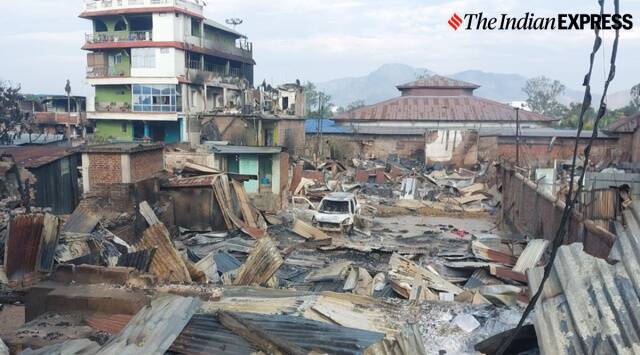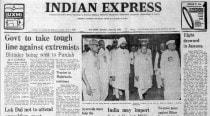Dear Prime Minister Modi, there are big and little fires everywhere, a healing touch is needed
A vote for you is not a vote against Nehruvian ideas. Criticise Nehru all you want. But don’t reach for the lowest hanging fruit, like changing names, because you will realise one day that erasing memory limits the range of a nation's ideas and narratives
 Destruction raged throughout Haokip Veng as ethnic violence rocked Manipur. (Express Photo: Jimmy Leivon)
Destruction raged throughout Haokip Veng as ethnic violence rocked Manipur. (Express Photo: Jimmy Leivon) Dear Prime Minister, I hope this letter finds you well.
First and foremost, I must acknowledge that I am writing this letter against the backdrop of continued violence in Manipur. For the past several weeks, the Opposition, including our party, civil society, the media, and even your own state party leaders, have been desperately trying to draw your attention towards the continuing violence and demanding that you at least say a few lines about the disturbing state of affairs. The entire state is burning. We hope that you will soon find the time to take appropriate steps and stem the violence that otherwise shows little sign of abating. A healing touch is needed.
The current governance environment is best characterised as “big and little fires everywhere”, cultivating a sense of permanent crisis in every realm of public life, from law enforcement to the economy. I am writing this particular letter to address several little fires the government has lit in our sense of history and heritage. Fiddling with textbooks has been one such simmering fire. Another recent one is the renaming of the Nehru Memorial Museum and Library to the Prime Ministers’ Museum and Library Society. This should have been avoided.
The logic of “democratising a space” or “respecting all the prime ministers” seems farcical and does not find much traction among the people. In your scheme of things, as was evident just a few weeks ago, a symbol of monarchy has more value than the Constitution. The inauguration of the new Parliament building needed a reaffirmation of constitutional values — justice, equality, fraternity, and freedom — rather than prostrating before a sengol. Such symbolism is not in sync with a nation that Jawaharlal Nehru thought should march on a progressive path, aided by modern ideas and a scientific temper. The symbolic value of the sengol, of course, has since been fixed at 25 parliamentary seats by your Home Minister.
I am aware that you and your party abhor Nehru and his ideas. This much is apparent given the general thrust of your politics, which equates legislative majority with authorisation for majoritarian politics. Nehru was not just the first prime minister of the country; he was someone who played a pivotal role in the Indian independence movement and is widely regarded as the architect of modern India. Nehru served as the first Prime Minister of India from 1947 to 1964 and contributed to shaping India’s political, economic, and social structures. As a staunch advocate of democracy and secularism, he believed in the idea of a pluralistic society that respected religious and cultural diversity. Nehru’s commitment to democratic institutions, secular values, modernisation, and individual freedoms resonates even now with a large section of the Indian population and remains an important part of India’s identity — an identity that helps you showcase India proudly when you visit abroad. Remember, you make repeated references to India as the “land of the Buddha and Gandhi” when abroad. Nehru was one of the most prominent custodians of this tradition and used it as a compass to guide India in spite of the violent memories of Partition. I am sure you would not disagree with me.
As I am writing this a few days before your US visit, you must recall that Nehru played a key role in the formation of the Non-Aligned Movement, which promoted the idea of the independence and sovereignty of developing nations during the Cold War era. This movement aimed to maintain equal distance from the two superpowers and promoted ideas of peaceful coexistence, global cooperation, and development. Nehru and his ministers did not choose to remain silent in view of the size and scale of the economy of a nation; for him, oppressed people anywhere were his natural constituency.
I have a feeling that you assume your first electoral victory in 2014 was a vote against Nehruvian ideas. I would urge you to correct this assumption, because the ashes of Nehru were not only scattered over the fields, mountains, and rivers of India but also became an inalienable part of our political and civic life. When the Emergency was imposed in 1975 by Indira Gandhi, it was this “inalienable part” that provided people with the art and act of resistance. Even now, Nehru and his ideas stand as a great wall to protect the country against any anti-democratic or reactionary onslaught.
Coming back to the recent renaming, I agree that all Indian prime ministers have made their own contribution to the journey of this nation since 1947. But unlike others, Teen Murti was home to the first prime minister. It was here that he met thousands of distressed families who approached him for help and a healing touch. It was not just a brick-and-mortar building; this was where people came looking for hope. They saw it as a source of light after having passed through miles-long, dark tunnels. Memory and history play a vital role in shaping a society’s identity and heritage. Erasing or distorting this collective memory amounts to a form of politics that can only be called ominous. Like any great leader, Nehru too can be criticised for hundreds of reasons, and your political worldview vis-à-vis Jawaharlal Nehru is understandable. Criticise him all you want. But the criticism must be substantive. You should not reach for the lowest hanging fruits, like changing names, because I believe you will one day realise that erasing memory limits the range of ideas and narratives.
It is time to put out the big and small fires. What one sees instead is that wounds that have healed are being picked at, and fires that were put out are being stoked.
I want to end with quoting a few lines from artist Amrita Sher-Gil’s letter to Jawaharlal Nehru on November 6, 1937, after receiving his autobiography. Shergil wrote: “Thanks for the book. As a rule, I dislike biographies and autobiographies. They ring false. Pomposity or exhibitionism. But I think I will like yours. You are able to discard your halo occasionally. You are capable of saying, ‘When I saw the sea for the first time,’ when others would say, ‘When the sea saw me for the first time’.”
Through this critical exchange, we get a measure of who Jawaharlal Nehru was — a visionary, not someone who wanted to distort the vision or, worse, become the vision himself.
The writer is MP (Rajya Sabha), Rashtriya Janata Dal








































